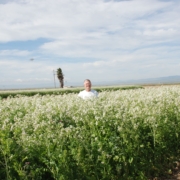20-Year California Study on Conservation Agriculture Shares Results
University of California Agriculture and Natural Resources scientists conducted a 20-year study of conservation agriculture practices, including no-till, cover crops, and integrating livestock, at the West Side Research and Extension Center in Fresno County, California. They published a summary of their soil and ecosystem study results in California Agriculture. Researchers grew a rotation of cotton-tomato, followed by a rotation of garbanzo, melons, and sorghum, and finally tomatoes, once they learned how to establish plants in a no-till system.The long-term approach of the study proved important. “For the first eight years, we didn’t see any changes whatsoever,” study leader Jeff Mitchell said. “But then they became strikingly different, between the no-till cover crop system and the conventional field without cover crops, and the divergence between those two systems became even starker.” The study also helped identify challenges that farmers can face with these practices, including pest management.

 Courtest Jeff Michell.
Courtest Jeff Michell. USDA photo by Bob Nichols.
USDA photo by Bob Nichols.